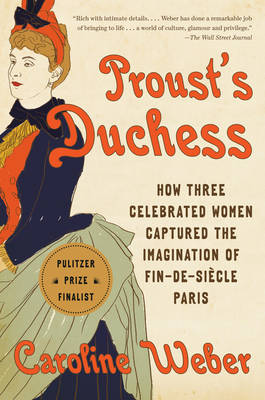
- Afhalen na 1 uur in een winkel met voorraad
- Gratis thuislevering in België vanaf € 30
- Ruim aanbod met 7 miljoen producten
- Afhalen na 1 uur in een winkel met voorraad
- Gratis thuislevering in België vanaf € 30
- Ruim aanbod met 7 miljoen producten
Zoeken
Proust's Duchess

How Three Celebrated Women Captured the Imagination of Fin-De-Siècle Paris
Caroline Weber
Paperback | Engels
€ 27,95
+ 55 punten
Prijzen
Omschrijving
PULITZER PRIZE FINALIST - A brilliant look at turn-of-the-century Paris through the first in-depth study of the three women Proust used to create his supreme fictional character, the Duchesse de Guermantes. "Weber has done a remarkable job of bringing to life...a world of culture, glamour and privilege." --The Wall Street Journal
Geneviève Halévy Bizet Straus; Laure de Sade, Comtesse de Adhéaume de Chevigné; and Élisabeth de Riquet de Caraman-Chimay, the Comtesse Greffulhe--these were the three superstars of fin-de-siècle Parisian high society who, as Caroline Weber says, "transformed themselves, and were transformed by those around them, into living legends: paragons of elegance, nobility, and style." All well but unhappily married, these women sought freedom and fulfillment by reinventing themselves, between the 1870s and 1890s, as icons. At their fabled salons, they inspired the creativity of several generations of writers, visual artists, composers, designers, and journalists. Against a rich historical backdrop, Weber takes the reader into these women's daily lives of masked balls, hunts, dinners, court visits, nights at the opera or theater. But we see as well the loneliness, rigid social rules, and loveless, arranged marriages that constricted these women's lives. Proust, as a twenty-year-old law student in 1892, would worship them from afar, and later meet them and create his celebrated composite character for The Remembrance of Things Past.
Geneviève Halévy Bizet Straus; Laure de Sade, Comtesse de Adhéaume de Chevigné; and Élisabeth de Riquet de Caraman-Chimay, the Comtesse Greffulhe--these were the three superstars of fin-de-siècle Parisian high society who, as Caroline Weber says, "transformed themselves, and were transformed by those around them, into living legends: paragons of elegance, nobility, and style." All well but unhappily married, these women sought freedom and fulfillment by reinventing themselves, between the 1870s and 1890s, as icons. At their fabled salons, they inspired the creativity of several generations of writers, visual artists, composers, designers, and journalists. Against a rich historical backdrop, Weber takes the reader into these women's daily lives of masked balls, hunts, dinners, court visits, nights at the opera or theater. But we see as well the loneliness, rigid social rules, and loveless, arranged marriages that constricted these women's lives. Proust, as a twenty-year-old law student in 1892, would worship them from afar, and later meet them and create his celebrated composite character for The Remembrance of Things Past.
Specificaties
Betrokkenen
- Auteur(s):
- Uitgeverij:
Inhoud
- Aantal bladzijden:
- 752
- Taal:
- Engels
Eigenschappen
- Productcode (EAN):
- 9780345803122
- Verschijningsdatum:
- 26/11/2019
- Uitvoering:
- Paperback
- Formaat:
- Trade paperback (VS)
- Afmetingen:
- 152 mm x 231 mm
- Gewicht:
- 929 g

Alleen bij Standaard Boekhandel
+ 55 punten op je klantenkaart van Standaard Boekhandel
Beoordelingen
We publiceren alleen reviews die voldoen aan de voorwaarden voor reviews. Bekijk onze voorwaarden voor reviews.













